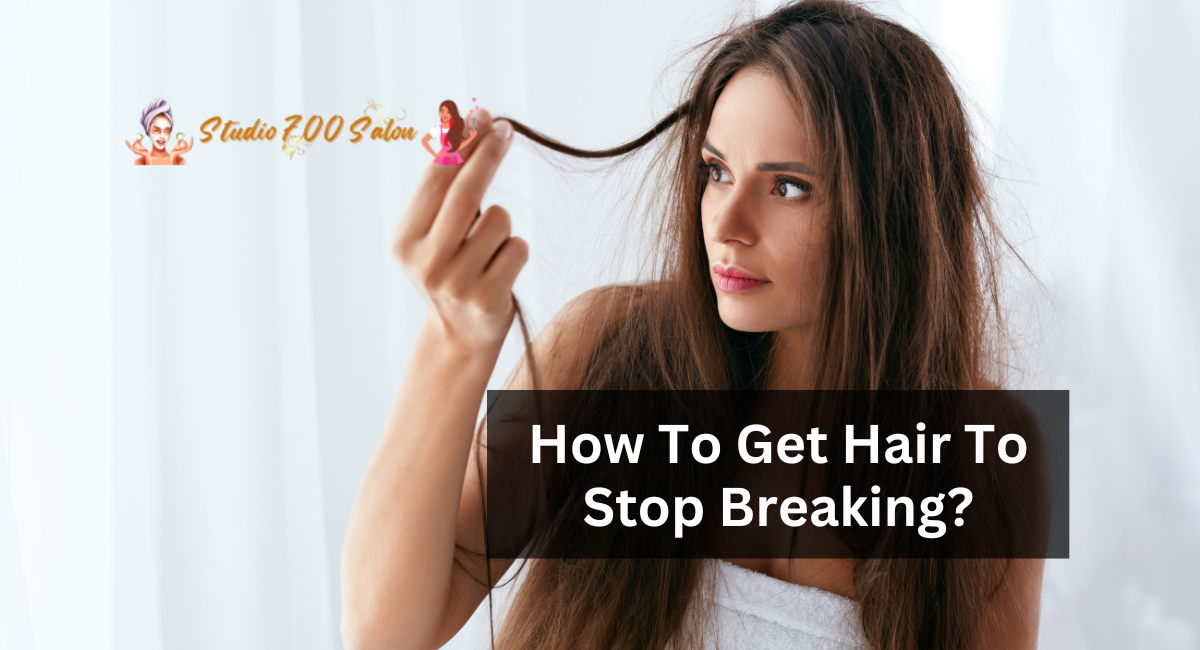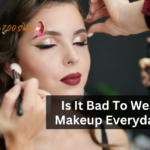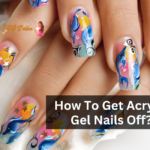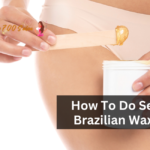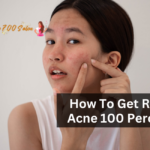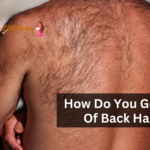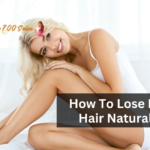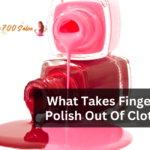Many people want beautiful, healthy hair, but dealing with hair breakage may be a stressful challenge.
Everyone wants to avoid breakage and promote strong, lustrous locks, whether their hair is long or short, straight or curly.
In this article, we’ll look at the most frequent reasons for hair breakage and offer practical advice on how to avoid it so you may have the hair you’ve always wanted.
How To Get Hair To Stop Breaking?
1. Keep Your Hair Moisturized
One of the biggest reasons your hair is falling out is that you aren’t moisturizing it sufficiently. This rule is especially crucial if you have curly hair, which is prone to brittleness and breakage.
If your hair is in desperate need of moisture, try the Born To Repair 60-Second Moisture Treatment With Shea Butter.
After bathing your hair with the Born To Repair Sulfate-Free Nourishing Shampoo, apply this liquid treatment to your scalp and strands for one minute and leave it on for one minute.
Its shea butter, babassu oil, and Amazonian nut oil heal overworked and damaged hair while regulating frizz.
Finish with Born To Repair Nourishing Conditioner With Shea Butter, a conditioner that strengthens while nourishing hair to increase the smoothness of curls and coils.
2. Target Split Ends Early
If your ends are already ragged and splitting, it may be time to visit a salon and get those strands clipped.
You can, however, extend this costly visit by using a hair oil on a daily basis to feed and hydrate your ends.
Apply a nourishing oil to your ends, such as the born to repair reviving hair oil with shea butter, which visibly seals split ends up to 84 percent with a blend of natural oils like jojoba, coconut, and olive oil.
This oil detangles and conditions your hair, leaving a lustrous finish that highlights the health of your hair.
3. Take It Easy On The Heat
Blow-drying and flat ironing hair frequently can be damaging to the strands. While air-drying hair is the ideal solution, it is often impractical for curly hair that takes longer to dry.
When using a hair dryer, get a diffuser attachment to reduce the direct heat your curls are exposed to.
If you must use heat, use the lowest heat setting possible and always use a heat protectant before using a hot tool.
4. Apply A Pre-Wash Moisturizer
On wash day, add hydration to your hair by soaking strands with a thick pre-shampoo conditioner and allowing it to remain for around 10 minutes before washing with shampoo.
With its particular mix of castor oil, black cumin seed oil, and ginger, the goddess strength ultra shield pre-poo with castor oil for curly hair protects hair from breakage while strengthening and nourishing hair.
This treatment will also aid in detangling hair before shampooing.
5. Shampoo Properly
When it comes to shampooing, make sure you’re doing it correctly. You’ve probably washed your hair your entire life and don’t need to be told how to do it again, so consider this section a refresher to reinforce what you already know.
It’s critical to use a sulfate-free shampoo (or even a co-wash) that doesn’t include harsh, stripping cleansers that cause hair to dry out.
The strengthening monoi repairing sulfate free shampoo, which washes and detangles hair while infusing monoi oil and coconut oil, is our favorite.
You should also be mindful of where you apply hair-washing products. Shampoo should only be applied to the scalp and not the hair shafts while washing your hair.
While your strands may have extra product buildup, the most of it will be on your scalp. The cleanser that runs down your strands as you wash is strong enough to dissolve any debris or product residue on the remainder of your hair.
6. Avoid The Harmful Hairstyle
Braiding your hair excessively tightly and exposing it to constant chemical changes (such as hair coloring, relaxing, and perming) can cause hair damage.
To clarify what we said earlier, too-tight protective styles can cause scalp irritation and hair damage.
When wearing your hair in a braided style or with hair extensions, make sure your hair isn’t being tugged too roughly, as this might damage your hair follicles and lead to irreversible hair loss.
The American academy of dermatology advises against wearing protective styles or hair extensions for more than two to three months.
If you enjoy coloring your hair in bright colors or prefer platinum hair, try to extend the time between salon visits to repair hair between color touch-ups.
Avoid doing double duty with chemical treatments – don’t have a keratin treatment on the same day you color your hair; it’s ideal for your hair’s health to reduce how frequently you chemically process your strands.
While wearing one of these styles, keep your scalp hydrated by using a scalp oil that won’t cause excessive product buildup.
We appreciate the Goddess Strength 7 Oil Blend Scalp & Hair Oil because it protects hair from breakage while also moisturizing the scalp and hair.
7. Consider A Hair Treatment
Hydrating curls and coils with a hair mask, deep conditioning treatment, or leave-in conditioner is one of the simplest ways to repair and prevent hair breakage.
To add nourishment to the hair, apply a mending mask to damp strands. The Monoi Repairing Hair Mask, which is filled with hair-nourishing Monoi oil, is a favorite since it addresses damage from roots to ends while also preventing future damage.
When you don’t have time to soak your hair for a wash-out treatment, use a leave-in conditioner to restore your hair while sculpting your curls.
Choose the Born To Repair Defining Leave-In Cream With Shea Butter, which softens, detangles, and smooths hair for the ideal second day, third day, and so on.
These products will keep hair hydrated in between showers and provide strands with the extra strength they require.
Causes Of Hair Breakage
Hair breakage can be a frustrating problem, but understanding what causes it is the first step in preventing and treating it.
We’ll look at the most prevalent causes of hair breakage and help you discover probable culprits in your hair care routine.
1. Excessive Styling
Heat styling appliances such as straighteners, curling irons, and blow dryers can cause damage to the hair shaft if used excessively. High temperatures degrade the protein structure of the hair, making it brittle.
2. Chemical Procedures
Chemical operations such as perming, bleaching, and dyeing can change the structure of the hair, making it more prone to breakage. Harsh chemicals can cause hair to become brittle and weak.
3. Poor Nutrition
A diet deficient in vital nutrients, particularly protein, vitamins, and minerals, can result in brittle and brittle hair. Because hair is mostly formed of a protein called keratin, protein consumption is critical for its strength.
4. Tight Hairstyles
Constantly twisting the hair into tight hairstyles such as braids, ponytails, or cornrows can cause damage to the hair shaft and follicles. This stress can cause breaking, especially in the hairline.
5. Environmental Damage
Environmental factors such as UV radiation from the sun, wind, and pollution can all harm your hair over time. UV radiation, in particular, can weaken the outer layer of the hair, making it more vulnerable to damage.
6. Rough Handling
Brushing too hard, especially while the hair is wet, can cause hair breakage. Wet hair is more brittle, and using a fine-toothed comb or applying too much force can cause strands to snap.
7. Lack Of Moisture
Hair requires adequate moisture to retain its suppleness and strength. Harsh shampoos, dry air, and insufficient conditioning can all strip the hair of its natural oils, resulting in dryness and breakage.
8. Chemical Buildup
The use of styling products such as gels, hairsprays, and serums can cause chemical buildup on the hair. This buildup can cause hair to become thick and prone to breaking.
9. Age
The natural production of lipids and proteins that maintain hair healthy can reduce as we age. This might cause hair to become more brittle and prone to breaking.
10. Medical Problems
Various medical illnesses, including thyroid abnormalities, nutritional deficits, and autoimmune diseases can cause hair breakage. If you suspect an underlying medical problem, you must seek medical attention immediately.
A mix of good practices and a commitment to correct maintenance is required to get healthy, breakage-free hair. Understanding the reasons for hair breakage and following these techniques will help you restore your hair’s natural beauty. Remember that patience and consistency are essential for witnessing hair health gains.
Thanks for reading. I hope you find it helpful.
